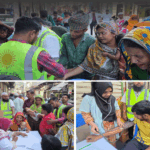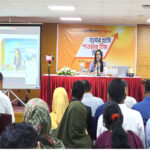Globally, approximately 314 million people are visually impaired, and 153 million of those impairments are due to uncorrected refractive errors such as near-sightedness, far-sightedness, or astigmatism. In Bangladesh, around 5 million people including children surje from a diagnosed refractive error. Further, there are hundreds of thousands of people who may not even be aware that they have a refractive handicap, particularly women who more commonly work in pro fessions which perform repetitive tasks, for example, the garment industry. Productivity losses associated with undiagnosed vision impairment from uncorrected myopia and presbyopia have a significant impact on economic losses in Bangladesh. Facing this unnerving challenge, the Surjer Hashi Network (SHN) has taken initiative to reduce the nancial burden due to vision impairment by introducing a “radical” approach to vision care in SHN clinics through a partnership with DOT Glasses. DOT Glasses is a social enterprise based in the Czech Republic that has previously partnered with Mercedes Benz and Essilor to design unisex frames, and manufacture glass lenses drastically below market rates to provide aordable eyewear for people in low to middle income classes. The MoU was signed on September 13, 2021, and pilot testing will commence in November 2021. By partnering with DOT Glasses, SHN will ultimately provide access to basic vision care for everyone in the catchment population of 5 selected clinics (Hajigonj, Panchbibi, Bakshiganj, Anwara, Patiya Rural). Through this initiative SHN hopes to increase productivity and earnings of low-income people (60% of people with uncorrected poor vision are women and girls) and help children to improve school performance.






